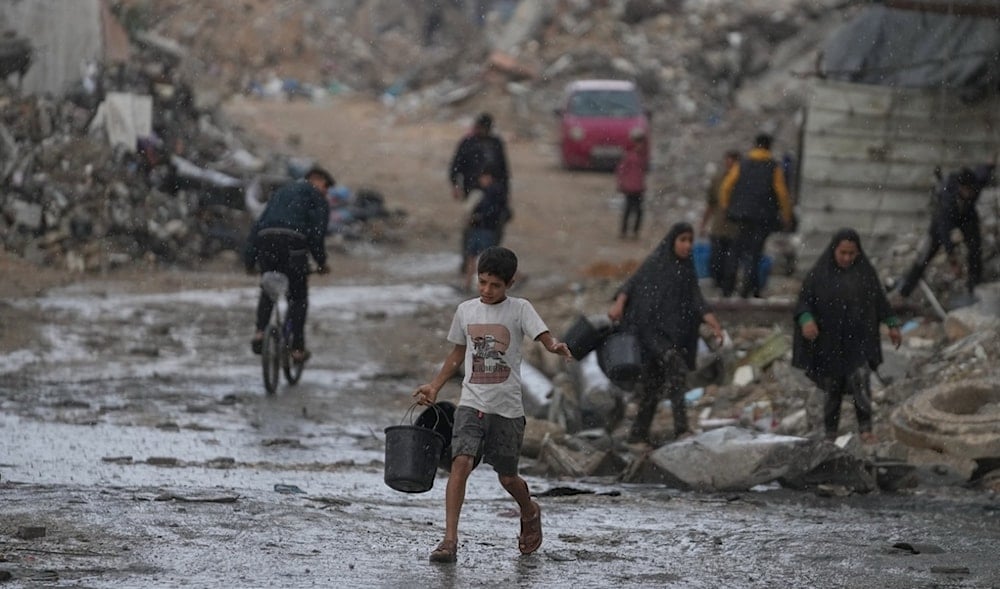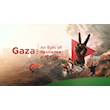Russia says its Gaza proposal does not conflict Washington's
Russia submitted a UN Security Council draft resolution on Gaza, challenging the US proposal over its neglect of the "two-state solution" and the approach to stabilizing the region.
-

A boy carries two empty buckets on his way to collect water amid a rainstorm in the Sheikh Radwan neighborhood of Gaza City, Friday, Nov. 14, 2025. (AP)
The Russian mission to the United Nations denied that its newly proposed draft resolution on the Gaza war is in conflict with Washington’s plan, but rather a constructive counter-proposal.
In a note sent Thursday afternoon to UN Security Council members, seen by Reuters, Russia stated that its “counter-proposal is inspired by the US draft.”
It emphasized that “the objective of our draft is to enable the Security Council to develop a balanced, acceptable, and unified approach toward achieving a sustainable cessation of hostilities.”
Russia warns Gaza ceasefire fragile
On November 10, Russian Permanent Representative to the United Nations, Vasily Nebenzya, cautioned that the ceasefire in the Gaza Strip remains fragile and warned against complacency, stressing the importance of addressing the core issues regarding the situation in occupied Gaza.
"Everyone [at the UN] is focused [on Gaza] because a monstrous tragedy has occurred there over these two years. Thank God that a ceasefire has been reached. It's quite fragile; we shouldn't be complacent. This ceasefire must continue," Nebenzya told RIA Novosti in an interview.
The Russian diplomat emphasized that the international community must not lose sight of the broader objective: a political solution based on the longstanding two-state framework. "We cannot throw the baby out with the bathwater," he said, referencing the UN-backed plan for the establishment of a Palestinian state.
Key differences between Russian and US proposals
Russia’s draft, submitted Thursday, was introduced as an alternative to a US resolution that faced pushback from Moscow, Beijing, and several Arab states. Moscow criticized the US plan for excluding the so-called two-state solution, a principle it sees as essential for any lasting resolution.
While modeled in part on the US proposal, the Russian resolution is positioned as a more balanced approach that addresses long-term stability and international consensus.
Dispute over 'international stabilization force'
The Russian draft calls on the UN Secretary-General to identify options for establishing an international force in Gaza. However, it notably omits reference to the “Board of Peace”, a transitional administrative body proposed in the US resolution.
Meanwhile, President Donald Trump’s 20-point plan for Gaza, which includes a phased peace framework and a captive release deal agreed to by “Israel” and the Palestinian resistance group Hamas in October, has been annexed to the US draft resolution.
Trump has ruled out deploying US troops in the Gaza Strip, though discussions have been held with countries such as Indonesia, the UAE, Egypt, Qatar, Türkiye, and Azerbaijan to contribute to a proposed 20,000-strong force.
US monopolizing resolutions
In a joint statement issued Friday, the US, Qatar, Egypt, the UAE, Saudi Arabia, Indonesia, Pakistan, Jordan, and Türkiye expressed “collective support” for the US draft. The coalition urged the Security Council to adopt the resolution “as soon as possible,” stressing the need to establishment of a foreign military presence in Gaza.
However, the US delegation alleged that competing proposals could jeopardize progress.
“Attempts to sow discord now – when agreement on this resolution is under active negotiation – has grave, tangible, and entirely avoidable consequences for Palestinians in Gaza,” claimed a US mission spokesperson. “The ceasefire is fragile and we urge the Council to unite and move forward to secure the peace that is desperately needed.”
While the US urges the Security Council to agree on a framework, it is worth noting that Washington itself obnstructed previous attempts to end the aggression on Gaza, exacerbating Palestinians' suffering and sowing more destruction in the besieged enclave, by vetoing six proposals for a permanent ceasefire.
Meanwhile, Moscow continues to advocate for a lasting resolution rooted in the UN Security Council-endorsed formula, calling for the establishment of a sovereign Palestinian state within the 1967 borders, with East al-Quds as its capital.
Read more: Israeli regime seeks 20-year US security pact to secure long-term aid

 4 Min Read
4 Min Read










